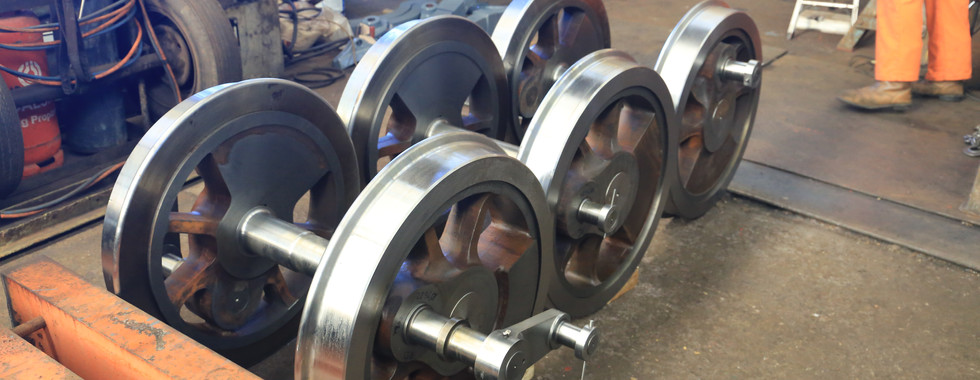Spring 2023 Update
- Joey Evans
- Apr 13, 2023
- 3 min read
January 24th was a big day for the project. After months of work and a lot of planning it was a day of arrivals. Late morning the platework for the cab, tanks and bunker was delivered from CTL Seal, Sheffield. This was rapidly unloaded and positioned out of the way as shortly afterwards the big delivery of the day arrived. This consisted of the carrier frames which had been riveted over the last few months at Gilspel Engineering together with a surface grinder which had been purchased from the same company. The other part of the load was the arrival of the much anticipated delivery of the new wheel sets for the power bogie which had been collected from Statfold Engineering who had carried out the machining of these items.

Platework of tanks etc. as delivered by CTL Seal
When the carrier frames had been lifted from the lorry they were placed on stands in the workshop to be followed by the wheelsets. In order to make an impressive assembly to show the progress we have managed to achieve, the power bogie frames were then placed roughly in their correct position which gave the opportunity to take photographs and also to give an impression of the size of the finished locomotive. The main comment was to the effect “It’s going to be big” or at least that’s what the meaning was without the expletives
With the return to the workshop of parts which had either been worked on or stored elsewhere it is now becoming possible to work on several items at the same time (personnel permitting). The decision has been taken to concentrate on the trailing bogie as a priority project and the relevant components have been collected from Statfold. The frames have now been drilled, Brian and Tony have been working on turning the tie bars for each end. Alan Cooper and Liam McNulty have been working on the Bridgeport machining the castings for the hornguides and other items. Our pattern maker has now been requested to produce the necessary patterns for the axle boxes for the trailing bogie and the recently acquired wheelsetsfor this are shortly to go to Statfold for alterations to the tyre profiles and axle ends to bring them into line with our requirements. Brian has also used his expertise to screw cut the acme thread for the handbrake screw, he will be able to finish this now that the nut has been made as an outside contract. All the leaf springs for the two bogies have now been ordered from Jones Springs. The first to be delivered will be those for the trailing bogie.

Holes being drilled in one of the trailing bogie frames

One of the hornguides in the Bridgeport miller

One of the hornguides in the Bridgeport miller

Handbrake screw thread being machined
At the time the carrier frames were returned there were still two angle brackets to be finished and riveted to the frame stretcher. The original brackets were made from heavy section angle but since this would be difficult to obtain they have been fabricated. These brackets have a curved slot machined in them in which a pin is situated, the purpose being to limit the vertical and sideways movement of the bogie. Some weeks after the delivery of the carrier frames these brackets were ready for fitting and arrangements were made for Richard Jeffs of Gilspel Engineering and Jon Ballard, Melbourne Bespoke Metalwork, to visit the workshop in order to rivet them in place.

Fabricated brackets being positioned and holes reamed prior to riveting

View from the other side of the stretcher

The first rivet in the furnace

The first rivet goes in


Brake cross shaft brackets machined and ready for cranks

Tapping holes for attaching trailing bogie horn stays

Machining trailing bogie tiebars

Machining trailing bogie tiebars

Trailing Bogie Axelbox Pattern

Trailing Bogie Axelbox Pattern

































Comments